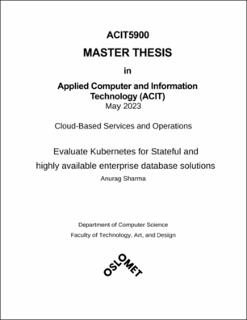| dc.description.abstract | With the increasing adoption of containerization and microservices, Kubernetes has become a popular choice for managing complex distributed systems. This project evaluates the feasibility of setting up a high availability (HA) environment on Kubernetes and testing enterprise databases (PostgreSQL, MariaDB, TiDB, and MySQL), focusing on HA setups having multiple replicas for databases. The project uses Azure Kubernetes Service (AKS) and documents factors such as database deployment, performance, and scalability of the database pods to assess the behavior of the databases. Kubernetes provides an ideal platform for running stateful applications, such as databases, with its support for stateful sets and persistent volumes. However, there are many considerations when setting up HA databases on Kubernetes, such as ensuring data consistency, managing backups and failover, and handling network and storage configurations. This thesis will explore the steps in setting up HA databases on Kubernetes, including choosing a suitable database technology and creating stateful sets for databases. The methodology involves a series of experiments on various popular databases running on Kubernetes clusters. The database throughput, latency, and resource utilization under different workloads and configurations were measured. The challenges in deploying and managing databases on Kubernetes, and comparing deployment models, such as Stateful Sets and Operators, were observed and then analyzed. Database performance benchmark tests were performed, and results indicate that Kubernetes can handle enterprise databases in HA, but each database has unique characteristics and requirements. MySQL and PostgreSQL performed better in all the categories of the benchmark tests compared to MariaDB and TiDB. The findings suggest that Kubernetes can be a viable platform for running enterprise databases but requires careful planning and configuration to achieve optimal results. Overall, the project demonstrates the potential for using Kubernetes in enterprise database management and suggests areas for further research and improvements. | en_US |
